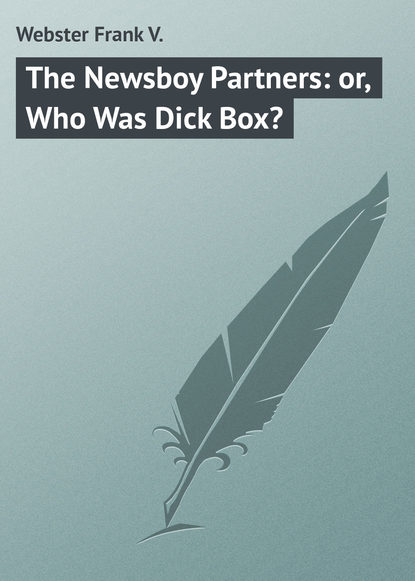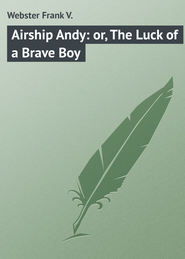По всем вопросам обращайтесь на: info@litportal.ru
(©) 2003-2024.
✖
The Newsboy Partners: or, Who Was Dick Box?
Настройки чтения
Размер шрифта
Высота строк
Поля
"Well, it wouldn't do any harm, I s'pose," admitted Jimmy. "Come ahead over to the lodging-house, and we'll tell him about this advertisement."
They found Dick feeling pretty comfortable, and, as he seemed able to converse about the mystery, Jimmy began on the subject that had brought Sam and himself to his partner's room.
"Dick," asked Jimmy, "you don't s'pose you ran away to fight Indians; did you?"
"Fight Indians? No. Why?"
"And you didn't take any money from your dad; did you?"
"Of course not. What makes you ask such questions?"
"Because it's in der paper," replied Sam. "See, iss dis got anyding to do mit you?" and he held out the torn piece of the newspaper.
Dick read it quickly, and slowly shook his head. A look of hope had come into his face when Sam had extended the slip, but it faded away again, leaving him pale and wan.
"No, I'm sure that isn't my name," he said.
"Are you sure?" asked Sam, who hated to give up the idea.
"Very sure."
"But didn't you want a pony?" asked the German youth.
"No, as near as I can remember, I had a horse or a pony," replied Dick. "I seem to recall something about owning one. I know I used to take long drives in a carriage, through a beautiful country."
"Den you didn't lif in New York," declared Sam, positively. "Dis is a great city, but dere ain't no beautiful country about it. I know. I lived in der country in der Vaterland, und dot vos country dere vot vos country," and he sighed in regret.
He looked at the piece of paper once more.
"Vait!" he exclaimed. "Vos you ever haf a desire for a bicycle? Maybe dot's it. Maybe your fadder vouldn't gif you a bicycle, und you runned avay to hund Indians, und dey scalped you, und took your remembery mit 'em."
"Oh, no, no!" exclaimed Dick, laughing in spite of himself. "I never cared much for a bicycle. I'm sure I shouldn't have run away from home because I couldn't have one."
"Und der Indians didn't scalp you?" asked Sam, as if still in doubt.
"No, indeed. I've got all my hair yet, even if my memory has gone back on me. I guess that must refer to some other boy. Why, of course it does. Here it says his first name is Isaac, and the description isn't at all like me."
"Vell, dot's so," admitted Sam, when he had read the item over again. "I guess it must be somebodies else dan you. I'm sorry, Dick. I thought sure I hat found out who you vos."
"I wish you had, Sam, but I'll find out some day."
Dick sighed in regret, for the strain was beginning to tell on him. Nevertheless he bore up well.
At the end of the week Dick was able to go out, and he felt so well that he insisted that he be allowed to sell papers.
"I don't think you're able to," objected Jimmy.
"Oh, yes, I am. Besides, I want to earn some money. I've been quite an expense to you."
"Crimps! I don't mean that. But that's nothing. Look what you did for me. I'm ever so much better off since I met you."
"I am glad you think so, but you must have had to draw some of our savings out of the bank for medicine and things, and I want to put it back so we can purchase that stand before Christmas, if possible."
"Oh, Christmas is quite a ways off. Besides, I only used about five dollars from the bank. Business has been very good lately, even with paying Frank and Sam a commission."
Since Dick's illness Jimmy had developed quite a business talent, and as he could now read and write some, he attended to matters connected with their little bank account, putting some in and at times drawing a dollar or so out, as it was needed.
Though Jimmy insisted that Dick take a rest before beginning to sell papers, the latter would not hear of it. The next day he started out with his bundle as usual, glad to be back at business once more. He was welcomed by many of his former customers, who remembered him, and he sold a large number of papers.
"How do you feel?" asked Jimmy that night when the partners were in their room.
"Pretty good, only a little tired. My, what a lot has happened since that night I thought you were hurt!"
"I should say so. Mike and Bulldog will not bother us for quite a while, I guess," and this proved a correct surmise, for some time later, at the trial, they were both convicted and sent to a reform school for long terms. Jimmy never recovered the money which Mike stole from him at the moving picture show nor that taken in Brooklyn.
"Yes, lots of things happened," went on Dick, "only I wish a little more had."
"What do you mean?"
"I mean I wish I knew who I was."
Jimmy said nothing. He did not like to see Dick sad, but he did not know how to help him in this matter. Would the mystery never be solved?
CHAPTER XXIV
MR. CROSSCRAB'S VISIT
Business with the partners went on as usual for several days. There was a brisk demand for papers, and slowly they saw the little savings in the bank grow. They began to have visions of a fine stand by Christmas, and the one they had first considered was still in their mind, for the owner had not succeeded in disposing of it.
"Dick," remarked Jimmy one night, "I've got a new scheme."
"What is it?" and Dick looked up from the book he was reading at his partner on the other side of the table. Jimmy was laboriously figuring on the back of an old envelope.
"Well, you know that weekly illustrated paper that's making such a hit now? It comes out every Friday, an' lots of the boys sell it."
"Yes, I know the one you mean. What about it?"
"I was thinking we might add it to our stock. If we did, and sold enough of 'em, we could make quite a bit. There's two and a half cents profit on each copy, and if we sold fifty each that'd be two dollars and a half each week."
"Good! You're coming on with your arithmetic," exclaimed Dick. "Why, that sounds good, Jimmy. Let's do it."
"There's one thing agin it, though."
"What's that?"
"There's no returns. You can't take back what you don't sell, and we might lose on it."
"Well, I suppose we'll have to take that risk. Business men generally have to venture something."










